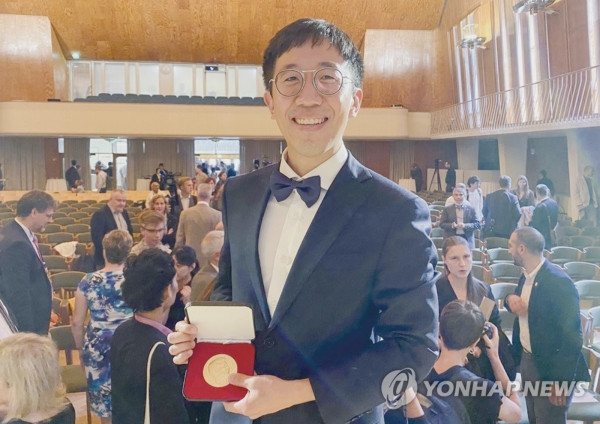
Professor June Huh at Princeton University is the first Korean American Mathematicians to receive the Fields Medal during the International Congress of Mathematicians (ICM) awards ceremony which was held in Finland in July. He grew up and graduated from Seoul National University, so an interest in the Fields Medal also increased in Korea. The Fields Medal is called the Nobel Prize of Mathematics, and Korean academia is paying much attention to it along with the Nobel Prize to be announced this fall.
The Fields Medal was established according to the will of J.C. Fields at the University of Toronto, and it is awarded to recognize outstanding mathematical achievement and to encourage future achievements. It is solely awarded in mathematics and is presented by the head of the host country at the ICM, which is held once every four years. The medal is conferred with cash prizes, less than the Nobel Prize, but the Fields Medal has a different value from the Nobel Prize and some scholars believe it is more prestigious than the Noble Prize.
The Fields Medal is the highest honor mathematicians can achieve, as it is always mentioned along with the Nobel Prize, but there are several differences between the valued awards.
First, only those under 40 years of age can receive the Fields Medal, because of the rule made in the process of interpreting the memos left by Prof. Fields. This is also because the Fields Medal is to inspire future research, while the Nobel Prize aims to praise achievements made over an entire lifetime.
As the Fields Medals both recognize and boost mathematical research, it is only awarded for one field, mathematics. The Nobel Prize, however, divides science into three categories and does not have an individual category for mathematics. It is presumed that this is because mathematics is a theoretical study, unlike the Nobel Prize that is awarded to research that has contributed to the development of humanity.
As such, the Fields Medal has some limitations like age compared to the Nobel Prize. There are several episodes related to this. First, Prof. Huh who is the recipient this year, is 39 years old and according to tradition, this is his last opportunity for the Fields Award. Moreover, there are not many chances of winning this award since it is awarded only once every four years.
Accordingly, some people were not eligible for the award even though they accomplished great achievements. For example, Prof. Andrew J. Wiles solved Fermat’s Last Theorem, but he did not satisfy the prize eligibility requirements because he was over 40 years old. However, the Fields committee presented a special tribute to honor his success, and his name was written on the list of Fields Medalists.
People claim that it more difficult to receive than the Nobel Prize because researchers must make remarkable research achievements in their 30s to receive the award before the age of 40. Apparently, according to some, most of the winners did not even study for the Fields Medal and were really quite modest about receiving the award.
Prof. Huh said he was not very good at math when he was young and really started to delve into it after he came to college. He thanked his teacher and colleagues in an award-winning interview by saying that they were the source of all his mathematical achievements.
Prof. Maryna Viazovska, who is also a Fields Medal winner, said she approached a problem in several steps, and gained confidence when she managed to reduce the problem to a functional equation. She also said she was right to have doubts until the end. She stated that she thought about how this award imposes a great amount of responsibility on a person, revealing she was exceptionally lucky to receive the award.


